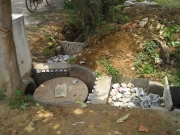- Topics
- Feature
- Opportunities & Events
- About
- Hindi Portal
- Data
- Topics
- Feature
- Opportunities & Events
- About
- Hindi Portal
- Data
 inwater harvesting.
inwater harvesting.This work was covered in a four-part series titled "Rainwater Harvesting in a Layout" in Citizen Matters, a Bangalore-centric online news magazine:
Rainbow Drive Layout's project page on Biome's website is here.